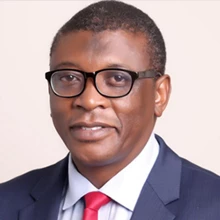The West African Institute for Financial and Economic Management (WAIFEM) has on Monday 20 May 2024 opened a week long cybersecurity, digital/crypto currencies training for central bankers drawn from across the sub-region, at the New Brookfields Hotel in Freetown.Welcoming participants at the opening session of the week-long course, the Director General, WAIFEM Dr Baba Yusuf Musa recalled that one of the concerns that were raised at the World Economic Forum in Davos is the pressing issue of cybersecurity. He said cyber concerns were brought at the forefront of global discussions. Dr Musa informed that the issue of Artificial Intelligence (AI) and cybersecurity were also discussed in detailed, adding that they were identified as the second-biggest challenge facing the global economy today and in future. ‘This recognition is not just a reflection of the current state of our interconnected digital world but also a clear call for action by all relevant stakeholders, he urged all, and continued, yet, digital currencies have the potential to transform our financial infrastructure, making it more robust, efficient and inclusive’. He observed that for a region with a high rate of unbanked individuals, the implications of digital financial solutions could be transformative, offering easier access to banking services and reducing transaction costs. Moreover, as digital currencies gain traction, they could significantly enhance cross-border trade and economic integration within the ECOWAS region.
Dr Musa disclosed that opportunities attached to ICT are not without their associated risks, explaining that the digital landscape is fraught with security threats, ranging from cyber fraud and scams, financing terrorism to more sophisticated cyberattacks that could threaten national and regional financial stability. He reminded participants and cyber fraudsters of the existing regulatory legal framework within West Africa that are still in developmental stages, which face challenges in creating a harmonized approach in managing and securing digital currencies.
On the core objectives of the training, Dr Musa explained that the course was designed to empower the participants from various sectors across West Africa, with knowledge and skills necessary to tackle emerging cybersecurity challenges. He told participants that facilitators will explore the fundamental aspects of cybersecurity as they relate to innovative sphere of Central Bank digital currencies and broader context of cryptocurrencies. We will address the critical need for robust legal and regulatory framework, explore the role of cybersecurity in protecting digital infrastructures and discuss how to build resilience against threats, vowed Dr Baba Yusuf Musa.
Delivering the keynote address, the Governor, Bank of Sierra Leone who was, ably represented by the Deputy Governor, Financial Stability, Mr Sheikh A. Y. Sesay said, cyber security is a national policy matter.
Mr Sesay defined the concept of cyber as the use of information technologies as a strategic resource in an effort to deliver effective, efficient, different and secured services to customers and key private and public sector players. He said; ‘the term cyberspace’ is used to describe systems and services connected either directly to or indirectly to the internet, telecommunications and computer networks’, and continue that the ever-growing reliance on cyberspace exposes organizations such as central banks and commercial banks, to the risk of computer-enabled espionage, fraud, sabotage and vandalism.
He informed that ICTs are indispensable tools for the operations of central banks, pointing out that; ‘cyber threat actors routinely access, steal and corrupt sensitive corporate and government information. Some of the cyber safety threats include viruses, hackers, identity thieves, and spyware’ as it is no longer a pure computer security issue but a national security concern.
He observed that the illicit use of cyberspace can hamper not only the success of an organization, but also the economic, public health, safety and national security of a country. The Deputy Bank Governor encouraged Chief Executive Officers and national leaders to remain vigilant for cyber security to forestall the consequences of cyberattacks.
He explained that cyber-attacks could result in loss of confidentiality, integrity and/or availability of valuable information and electronic data, adding that loss of access to the organization computing network, and lawsuits, loss of public trust, prosecution, internal disciplinary action or termination of employment. Mr Sesay emphasized the need to enhance cybersecurity by protecting critical information infrastructures as essential posture any nation’s security and economic well-being.
He reminded participants of a shared responsibility that require coordinated action related to the prevention, preparation, response, and recovery from incidents on the part of government authorities, the private sector and citizens. He also entreated his regional guests and international partners that the drive entails cooperation and coordination with the relevant partners, through the formulation and implementation of a national framework for cybersecurity and critical information infrastructure protection (CIIP) along with a comprehensive approach.
He outlined that following cyber safety actions that are required to be taken into consideration, which are the install OS/software updates, run anti-virus software, the prevention of identity theft, constant turning on of personal firewalls, the avoidance of spyware/adware, protection of passwords and backing up important files.











